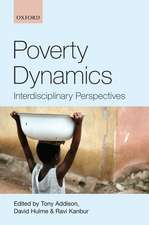Linking the Formal and Informal Economy: Concepts and Policies: WIDER Studies in Development Economics
Editat de Basudeb Guha-Khasnobis, Ravi Kanbur, The late Elinor Ostromen Limba Engleză Paperback – 20 sep 2007
| Toate formatele și edițiile | Preț | Express |
|---|---|---|
| Paperback (1) | 334.18 lei 31-37 zile | |
| OUP OXFORD – 20 sep 2007 | 334.18 lei 31-37 zile | |
| Hardback (1) | 862.97 lei 31-37 zile | |
| OUP OXFORD – 21 sep 2006 | 862.97 lei 31-37 zile |
Din seria WIDER Studies in Development Economics
- 30%
 Preț: 504.34 lei
Preț: 504.34 lei - 26%
 Preț: 733.49 lei
Preț: 733.49 lei - 30%
 Preț: 597.88 lei
Preț: 597.88 lei - 17%
 Preț: 594.16 lei
Preț: 594.16 lei - 7%
 Preț: 159.68 lei
Preț: 159.68 lei - 13%
 Preț: 737.02 lei
Preț: 737.02 lei - 17%
 Preț: 583.39 lei
Preț: 583.39 lei - 28%
 Preț: 473.92 lei
Preț: 473.92 lei - 30%
 Preț: 501.49 lei
Preț: 501.49 lei - 30%
 Preț: 724.70 lei
Preț: 724.70 lei - 30%
 Preț: 748.64 lei
Preț: 748.64 lei - 31%
 Preț: 434.64 lei
Preț: 434.64 lei - 18%
 Preț: 333.97 lei
Preț: 333.97 lei - 34%
 Preț: 848.58 lei
Preț: 848.58 lei - 34%
 Preț: 847.76 lei
Preț: 847.76 lei - 34%
 Preț: 803.83 lei
Preț: 803.83 lei - 34%
 Preț: 954.23 lei
Preț: 954.23 lei - 34%
 Preț: 892.48 lei
Preț: 892.48 lei - 22%
 Preț: 188.78 lei
Preț: 188.78 lei - 30%
 Preț: 617.12 lei
Preț: 617.12 lei - 27%
 Preț: 378.41 lei
Preț: 378.41 lei - 34%
 Preț: 1039.04 lei
Preț: 1039.04 lei - 34%
 Preț: 1043.37 lei
Preț: 1043.37 lei - 27%
 Preț: 329.58 lei
Preț: 329.58 lei - 34%
 Preț: 1292.22 lei
Preț: 1292.22 lei - 23%
 Preț: 1213.11 lei
Preț: 1213.11 lei - 34%
 Preț: 879.41 lei
Preț: 879.41 lei - 19%
 Preț: 652.21 lei
Preț: 652.21 lei - 34%
 Preț: 1039.15 lei
Preț: 1039.15 lei - 34%
 Preț: 892.84 lei
Preț: 892.84 lei - 27%
 Preț: 443.57 lei
Preț: 443.57 lei - 22%
 Preț: 526.67 lei
Preț: 526.67 lei - 30%
 Preț: 913.24 lei
Preț: 913.24 lei - 34%
 Preț: 997.55 lei
Preț: 997.55 lei - 31%
 Preț: 396.19 lei
Preț: 396.19 lei - 17%
 Preț: 413.16 lei
Preț: 413.16 lei - 34%
 Preț: 1188.13 lei
Preț: 1188.13 lei - 34%
 Preț: 817.30 lei
Preț: 817.30 lei - 30%
 Preț: 1012.76 lei
Preț: 1012.76 lei - 7%
 Preț: 360.77 lei
Preț: 360.77 lei - 31%
 Preț: 447.33 lei
Preț: 447.33 lei - 27%
 Preț: 1295.58 lei
Preț: 1295.58 lei - 31%
 Preț: 441.21 lei
Preț: 441.21 lei
Preț: 334.18 lei
Preț vechi: 409.71 lei
-18% Nou
Puncte Express: 501
Preț estimativ în valută:
63.94€ • 66.94$ • 52.91£
63.94€ • 66.94$ • 52.91£
Carte tipărită la comandă
Livrare economică 25-31 martie
Preluare comenzi: 021 569.72.76
Specificații
ISBN-13: 9780199237296
ISBN-10: 0199237298
Pagini: 312
Ilustrații: numerous tables and figures
Dimensiuni: 156 x 234 x 16 mm
Greutate: 0.48 kg
Editura: OUP OXFORD
Colecția OUP Oxford
Seria WIDER Studies in Development Economics
Locul publicării:Oxford, United Kingdom
ISBN-10: 0199237298
Pagini: 312
Ilustrații: numerous tables and figures
Dimensiuni: 156 x 234 x 16 mm
Greutate: 0.48 kg
Editura: OUP OXFORD
Colecția OUP Oxford
Seria WIDER Studies in Development Economics
Locul publicării:Oxford, United Kingdom
Recenzii
Review from previous edition No matter how you divide up the developing world-'formal-informal', 'legal-extralegal' (my preference)- one thing is not debatable: most people are poor, on the outside of the system looking in, and getting angrier every day. The message of this book is it's time to stop talking and start designing reforms based on the informal practices and organizations that poor entrepreneurs already use. I second that motion. If you rebuild the system from the bottom-up, they will come, with their enterprise, creativity, and piles of potential capital.
The obvious is not necessarily the best. For many, a well-defined set of formal institutions is the obvious road to economic success. Academic analysts are attracted by the parsimony of formal institutions. Policy makers appreciate the apparent predictability of the effect on addressees. Constitutional lawyers prefer formal institutions since they lend themselves to ex post control. Yet as the book convincingly demonstrates, in many contexts, and in developing countries in particular, going for the obvious is bad policy. Imposing a small set of formal institutions forces all economic activity into a Procrustes' bed. Often, a clever mixture of formal and informal elements has two main advantages: harnessing new resources for corporate governance, and making the firm more responsive to its environment, be it demand, competition or regulatory expectations.
Linking the Formal and Informal Economy is an excellent synthesis of past debates and contemporary policy analysis. It embraces economic development, governance and social justice issues and it provides innovative case studies from a wide variety of contexts.
The obvious is not necessarily the best. For many, a well-defined set of formal institutions is the obvious road to economic success. Academic analysts are attracted by the parsimony of formal institutions. Policy makers appreciate the apparent predictability of the effect on addressees. Constitutional lawyers prefer formal institutions since they lend themselves to ex post control. Yet as the book convincingly demonstrates, in many contexts, and in developing countries in particular, going for the obvious is bad policy. Imposing a small set of formal institutions forces all economic activity into a Procrustes' bed. Often, a clever mixture of formal and informal elements has two main advantages: harnessing new resources for corporate governance, and making the firm more responsive to its environment, be it demand, competition or regulatory expectations.
Linking the Formal and Informal Economy is an excellent synthesis of past debates and contemporary policy analysis. It embraces economic development, governance and social justice issues and it provides innovative case studies from a wide variety of contexts.
Notă biografică
Basudeb Guha-Khasnobis is a Senior Research Fellow at UNU-WIDER. He is a PhD from the University of Rochester and worked for IGIDR (Mumbai), ICRIER (New Delhi) and The Exim Bank of India. His research interests include international economics, development economics and financial economics.Ravi Kanbur is T.H. Lee Professor of World Affairs, International Professor of Applied Economics and Management, and Professor of Economics at Cornell University, and previously Professor of Economics at the University of Warwick, and Chief Economist for Africa at the World Bank.Elinor Ostrom was Arthur F. Bentley Professor of Political Science at Indiana University. She was also Co-Director, Workshop in Political Theory and Policy Analysis and Co-Director, Center for the Study of Institutions, Population and Environmental Change (CIPEC) at Indiana University. She was a member of the Expert Group on Development Issues of the Swedish Ministry for Foreign Affairs.













